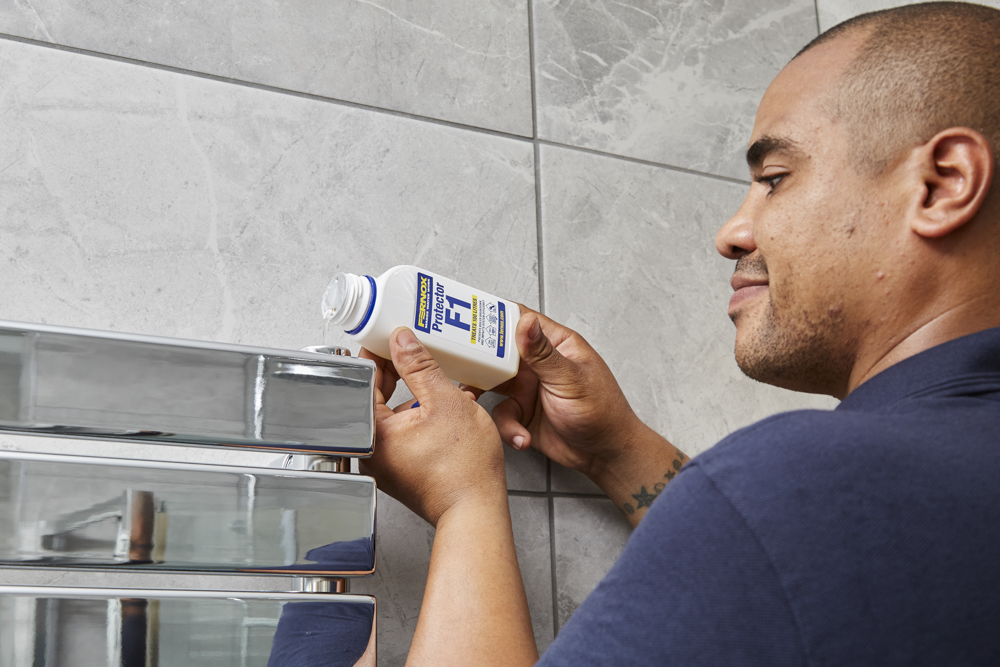Richard Crisp, Head of Chemistry & External Affairs at Fernox explains the role of chemical water treatment and filter technology in keeping domestic heating systems efficient and working effectively. Crucially, he goes on to summarise what you need to do to ensure compliance with the latest version of Part L of the Building Regulations.
Why do central heating systems require maintenance?
Poor system water quality must be addressed to ensure the longevity of any heating system, and to help improve the energy efficiency of the property. Corrosion debris and microbial fouling can build up within a heating system over time. Water contamination can also occur through installation materials used in a new heating installation. This material circulating within the system can cause blockages that result in the system having to work harder to heat the property as well as reducing the service life of critical system components. Ultimately, this will translate into additional costs to maintain and repair the heating system more frequently as well as increase household bills. As such, it is essential to incorporate regular cleaning regimes using recognised chemical treatment.
Ensure you comply with Part L of the building regulations
Approved Document Part L, Volume 1 covers the Conservation of Fuel and Power and is concerned with the thermal performance and energy efficiency of residential buildings. It is important to know that in its most recent updates, heating system installations, service and repairs undertaken by a contractor, must be done in accordance with BS 7593:2019. You should also be aware that:
- The maximum flow temperature for new and replacement heating systems has been reduced to 55°C and for heat pump applications 45°C, increasing the risk of microbiological fouling.
- In hard water areas which exceed 200ppm, provision must be made to reduce the rate of limescale formation as well as limiting its harmful effects on energy efficiency.
It is crucial that a heating system is chemically cleaned if it is heavily contaminated, or if a new radiator and / or extra pipework is added, or a new boiler is installed. Using a system cleaner along with a recognised cleaning method like powerflushing is recommended for the best results. Once cleaned, an in-line filter must be installed to help provide continued protection for the boiler and maintain efficiency.
To protect the system against corrosion, scale and microbial fouling, the system should be dosed with the correct quantity of suitable chemical water treatment products. When it comes to ongoing maintenance, servicing of in-line filters is recommended as part of the re-commissioning process, and ideally as part of the annual boiler service, to remove any sludge or debris that has been captured by a filter. Finally, there should be an annual water test of inhibitor levels and system cleanliness, and the re-dosing of inhibitor, or a full system water test, every five years.
Remember, failure to meet these regulations is a criminal offence and if convicted, a person can be fined up to £5,000.
Seek support and guidance
Whilst it is extremely important to understand the building regulations yourself, it is always worthwhile seeking support from a specialist. When it comes to chemical water treatments and filter technology – there are a wide range of solutions available on the market, and as such it can be incredibly valuable to obtain guidance about the most appropriate option so that you can achieve the best results for your tenants.
Conclusion
Finally, trying to maintain a housing stock with energy efficient and effective central heating systems can be fraught with challenges but it remains fundamental to the provision of safe, warm, and decent homes. There are clear requirements under Part L of the Building Regulations that legally must be adhered to, along with a wide range of product solutions that can have a truly significant impact.
For further information about keeping central heating systems efficient and the types of chemical water treatments and filters that can help, visit: www.fernox.com



